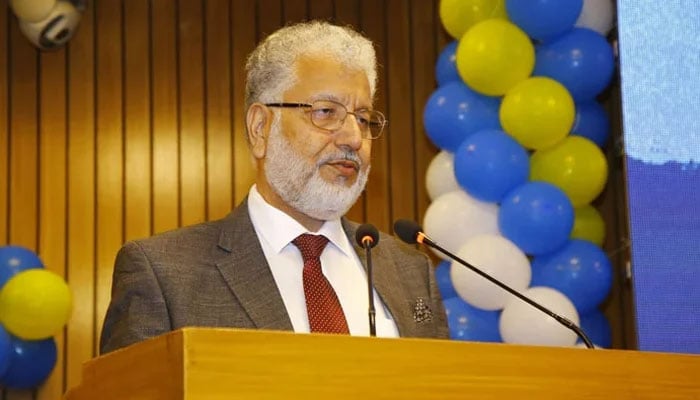Pakistan needs platform for climate change solutions as world not going to help: experts
Chairman Higher Education Commission (HEC) Dr Mukhtar Ahmed has announced plans to raise approximately Rs100 million to establish a national platform of experts dedicated to addressing the escalating challenges posed by climate change.
Speaking as the chief guest at the inaugural ceremony of the Aga Khan University (AKU) Symposium on Climate Change, Agriculture, Human Nutrition & Development in Pakistan, he emphasized the urgent need for collective action and innovative solutions to mitigate climate impacts on health, agriculture, food security, and nutrition.
The proposal for the platform was initiated by Dr Zulfiqar Bhutta, distinguished professor and founding director of the AKU’s Institute for Global Health & Development (IGHD), who highlighted the importance of bringing experts together to work cohesively rather than in silos.
“Climate change is an existential threat for Pakistan,” Dr Bhutta warned. “We face a crisis of undernutrition, and if immediate steps are not taken, half of the population could be food insecure within the next decade.” He urged institutions to focus on climate-smart agriculture and sustainable practices, as reliance on external aid is not a viable long-term solution.
Dr Mukhtar Ahmed urged students and scientists to disseminate their knowledge beyond academic settings, enabling communities to combat climate challenges such as prolonged heatwaves, droughts, and erratic weather patterns.
“We are experiencing unprecedented changes in weather patterns, with extremely warm conditions persisting even in November and December,” he said, stressing the importance of equipping Pakistan with innovative, locally-driven solutions.
The HEC chairman expressed optimism about the platform’s potential to revolutionize Pakistan’s climate resilience efforts by uniting policymakers, researchers, and practitioners. He praised the AKU for organizing the conference and fostering dialogue on climate change’s most pressing challenges. “Institutions like AKU play a pivotal role in connecting research to policy and practice,” he said.
Concluding the session, Dr Ahmed emphasized that the platform would not only address the immediate impacts of climate change but also ensure sustainable development for future generations. “Together, we can overcome these challenges and build a healthier, more resilient Pakistan.”
The symposium, hosted by the AKU’s IGHD in collaboration with the Sustainable Development Solutions Network Pakistan, gathered national and international experts to discuss climate change’s profound effectson agriculture, health, and nutrition.
Dr Sulaiman Shahabuddin, president of the AKU, reaffirmed the university’s commitment to fostering interdisciplinary research and partnerships to address Pakistan’s growing climate challenges. “As one of the region’s leading institutions, we aim to inspire actionable solutions that strengthen resilience and ensure a sustainable future,” he said.
The event featured keynote addresses from global experts, including Prof Sir Andrew Haines of the London School of Hygiene & Tropical Medicine, who discussed the implications of climate change for planetary health and development.
Dr Lynette Neufeld, director of Food and Nutrition at the Food and Agriculture Organization (FAO), highlighted the intersection of climate change, agriculture, and human nutrition, with a focus on Pakistan.
Local experts like Dr Haris Gazdar from the Collective for Social Science Research shed light on the gender dimensions of food security, emphasizing how women in rural areas are disproportionately affected by climate-induced food insecurity.
“Women’s workloads are increasing as migration patterns shift due to climate pressures, and traditional gender roles exacerbate their vulnerability,” he said. The speakers collectively called for inclusive, equity-focused strategies to ensure that marginalized communities are not left behind in adaptation efforts. Research indicates that climate change’s impacts are disproportionately severe in low- and middle-income countries, despite greenhouse gas emissions originating predominantly from wealthy nations. For Pakistan, the stakes are particularly high, with rising temperatures, severe droughts, and increasing food insecurity threatening millions.
-
 Hong Kong Court Sentences Media Tycoon Jimmy Lai To 20-years: Full List Of Charges Explained
Hong Kong Court Sentences Media Tycoon Jimmy Lai To 20-years: Full List Of Charges Explained -
 Coffee Reduces Cancer Risk, Research Suggests
Coffee Reduces Cancer Risk, Research Suggests -
 Katie Price Defends Marriage To Lee Andrews After Receiving Multiple Warnings
Katie Price Defends Marriage To Lee Andrews After Receiving Multiple Warnings -
 Seahawks Super Bowl Victory Parade 2026: Schedule, Route & Seattle Celebration Plans
Seahawks Super Bowl Victory Parade 2026: Schedule, Route & Seattle Celebration Plans -
 Keto Diet Emerges As Key To Alzheimer's Cure
Keto Diet Emerges As Key To Alzheimer's Cure -
 Chris Brown Reacts To Bad Bunny's Super Bowl LX Halftime Performance
Chris Brown Reacts To Bad Bunny's Super Bowl LX Halftime Performance -
 Trump Passes Verdict On Bad Bunny’s Super Bowl Halftime Show
Trump Passes Verdict On Bad Bunny’s Super Bowl Halftime Show -
 Super Bowl 2026 Live: Seahawks Defeat Patriots 29-13 To Win Super Bowl LX
Super Bowl 2026 Live: Seahawks Defeat Patriots 29-13 To Win Super Bowl LX -
 Kim Kardashian And Lewis Hamilton Make First Public Appearance As A Couple At Super Bowl 2026
Kim Kardashian And Lewis Hamilton Make First Public Appearance As A Couple At Super Bowl 2026 -
 Romeo And Cruz Beckham Subtly Roast Brooklyn With New Family Tattoos
Romeo And Cruz Beckham Subtly Roast Brooklyn With New Family Tattoos -
 Meghan Markle Called Out For Unturthful Comment About Queen Curtsy
Meghan Markle Called Out For Unturthful Comment About Queen Curtsy -
 Bad Bunny Headlines Super Bowl With Hits, Dancers And Celebrity Guests
Bad Bunny Headlines Super Bowl With Hits, Dancers And Celebrity Guests -
 Insiders Weigh In On Kim Kardashian And Lewis Hamilton's Relationship
Insiders Weigh In On Kim Kardashian And Lewis Hamilton's Relationship -
 Prince William, Kate Middleton Private Time At Posh French Location Laid Bare
Prince William, Kate Middleton Private Time At Posh French Location Laid Bare -
 Stefon Diggs Family Explained: How Many Children The Patriots Star Has And With Whom
Stefon Diggs Family Explained: How Many Children The Patriots Star Has And With Whom -
 ‘Narcissist’ Andrew Still Feels ‘invincible’ After Exile
‘Narcissist’ Andrew Still Feels ‘invincible’ After Exile




